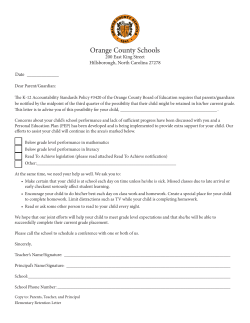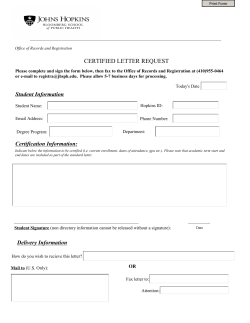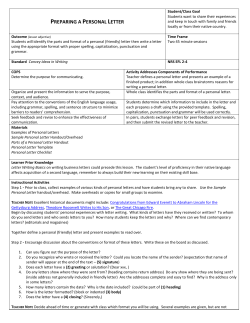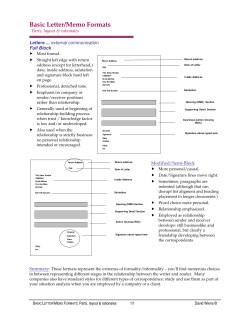
Document 37705
STANDARD VERSION This agreement consists of two pages and a notarization page. Instructions for filling out this document may be found on page 4. It is important that the instructions be carefully read and followed in completing the form THIS AGREEMENT made on the day of the month of in the year 20________, in the City/Town/Village of , State of between Husband-to-be: residing at: and Wife-to-Be: residing at: The parties, who intend to be married in the near future, hereby agree as follows: I. Should a dispute arise between the parties after they are married, so that they do not live together as husband and wife, they agree to refer their marital dispute to the Beth Din of the United States of America, Inc. (currently located at 305 Seventh Ave., New York, NY 10001, tel. 212 807-9042, www.bethdin.org), acting as an arbitration panel, for a binding decision. II. The decision of the Beth Din of America shall be fully enforceable in any court of competent jurisdiction. III. The parties agree that the Beth Din of America has exclusive jurisdiction to decide all issues relating to a get (Jewish divorce) as well as any issues arising from this Agreement or the ketubah and tena'im (Jewish premarital agreements) entered into by the Husband-to-Be and the Wife-to-Be. Each of the parties agrees to appear in person before the Beth Din of America at the demand of the other party. SECTION IV:A regarding additional financial issues is optional. Parties may select IV:A(1), IV:A(2) or IV:A(3) (but not more than one of these paragraphs). Unless one of these options is chosen, the Beth Din of America will be without jurisdiction to address matters of general financial disputes between the parties. For more information, see the instructions. IV:A(1). The parties agree that the Beth Din of America is authorized to decide all monetary disputes (including division of property and maintenance) that may arise between them. We choose to have Paragraph IV:A(1) apply to our arbitration agreement. IV:A(2). The parties agree that the Beth Din of America is authorized to decide all monetary disputes (including division of property and maintenance) that may arise between them based on principles of equitable distribution law customarily employed in the United States as found in the Uniform Marriage and Divorce Act. We choose to have Paragraph IV:A(2) apply to our arbitration agreement. IV:A(3). The parties agree that the Beth Din of America is authorized to decide all monetary disputes (including division of property and maintenance) that may arise between them based on principles of community property law customarily employed in the United States as found in the Uniform Marriage and Divorce Act. We choose to have Paragraph IV:A(3) apply to our arbitration agreement. Signature of Husband-to-Be Signature of Husband-to-Be Signature of Husband-to-Be Signature of Wife-to-Be Signature of Wife-to-Be Signature of Wife-to-Be SECTION IV:B regarding parenting disputes is optional. Unless this option is chosen, the Beth Din of America will be without jurisdiction to address matters of parenting disputes between the parties. For more information, see the instructions. IV:B. The parties agree that the Beth Din of America is authorized to decide all disputes, including child custody, child support, and visitation matters, as well as any other disputes that may arise between them. We choose to have Section IV:B apply to our arbitration agreement. Signature of Husband-to-Be Signature of Wife-to-Be IV:C. The Beth Din of America may consider the respective responsibilities of either or both of the parties for the end of the marriage, as an additional, but not exclusive, factor in determining the distribution of marital property and maintenance, should such a determination be authorized by Section IV:A or Section IV:B. Page 1 of 4 PS 1.4 INITIALS STANDARD VERSION V. Failure of either party to perform his or her obligations under this Agreement shall make that party liable for all costs awarded by either the Beth Din of America or a court of competent jurisdiction, including reasonable attorney's fees, incurred by one side in order to obtain the other party's performance of the terms of this Agreement. VI. The decision of the Beth Din of America shall be made in accordance with Jewish law (halakha) or Beth Din ordered settlement in accordance with the principles of Jewish law (peshara krova la-din), except as specifically provided otherwise in this Agreement. The parties waive their right to contest the jurisdiction or procedures of the Beth Din of America or the validity of this Agreement in any other rabbinical court or arbitration forum other than the Beth Din of America. The parties agree to abide by the published Rules and Procedures of the Beth Din of America (which are available at www.bethdin.org, or by calling the Beth Din of America) which are in effect at the time of the arbitration. The Beth Din of America shall follow its rules and procedures, which shall govern this arbitration to the fullest extent permitted by law. Both parties obligate themselves to pay for the services of the Beth Din of America as directed by the Beth Din of America. VII. The parties agree to appear in person before the Beth Din of America at the demand of the other party, and to cooperate with the adjudication of the Beth Din of America in every way and manner. In the event of the failure of either party to appear before the Beth Din of America upon reasonable notice, the Beth Din of America may issue its decision despite the defaulting party's failure to appear, and may impose costs and other penalties as legally permitted. Furthermore, Husband-to-Be acknowledges that he recites and accepts the following: I hereby now (me'achshav), obligate myself to support my Wife-to-Be from the date that our domestic residence together shall cease for whatever reasons, at the rate of $150 per day (calculated as of the date of our marriage, adjusted annually by the Consumer Price Index–All Urban Consumers, as published by the US Department of Labor, Bureau of Labor Statistics) in lieu of my Jewish law obligation of support so long as the two of us remain married according to Jewish law, even if she has another source of income or earnings. Furthermore, I waive my halakhic rights to my wife's earnings for the period that she is entitled to the above stipulated sum, and I recite that I shall be deemed to have repeated this waiver at the time of our wedding. I acknowledge that I have now (me’achshav) effected the above obligation by means of a kinyan (formal Jewish transaction) in an esteemed (chashuv) Beth Din as prescribed by Jewish law. However, this support obligation shall terminate if Wife-to-Be refuses to appear upon due notice before the Beth Din of America or in the event that Wife-to-Be fails to abide by the decision or recommendation of the Beth Din of America. Furthermore, Wife-to-Be waives her right to collect any portion of this support obligation attributable to the period preceding the date of her reasonable attempt to provide written notification to Husband-toBe that she intends to collect the above sum. Said written notification must include Wife-to-Be’s notarized signature. This support obligation under Jewish law is independent of any civil or State law obligation for spousal support, or any civil or State law imposed order for spousal support, and shall be determined only by the Beth Din of America. VIII. This Agreement may be signed in one or more duplicates, each one of which shall be considered an original. IX. This Agreement constitutes a fully enforceable arbitration agreement. Should any provision of this Agreement be deemed unenforceable, all other surviving provisions shall still be deemed fully enforceable; each and every provision of this Agreement shall be severable from the other. As a matter of Jewish law, the parties agree that to effectuate this agreement in full form and purpose, they accept now (through the Jewish law mechanism of kim li) whatever minority views determined by the Beth Din of America are needed to effectuate the obligations contained in Section VII and the procedures and jurisdictional mandates found in Sections I, II, III and VI of this Agreement. X. Each of the parties acknowledges that he or she has been given the opportunity prior to signing this Agreement to consult with his or her own rabbinic advisor and legal advisor. Each of the parties expressly waives, in connection with this agreement, (i) any right to consult with his or her legal counsel to the extent they have not done so and (ii) any right to disclosure of the property or financial obligations of the other party beyond any disclosures that have been provided. The obligations and conditions contained herein are executed according to all legal and halachic requirements. In witness of all the above, the Husband-to-Be and Wife-to-Be have entered into this Agreement. Signature of Husband-to-Be Signature of Wife-to-Be Signature of Witness Signature of Witness Signature of Witness Signature of Witness Notarization forms appear on the next page. For further information about notarization, see the instructions. Page 2 of 4 PS 1.4 STANDARD VERSION Notarization Forms Acknowledgement for Husband-to-Be Acknowledgement for Wife-to-Be State of _________________ County of _______________ State of _________________ County of ____________________ On the _____ day of __________ in the year _____ before me, the On the _____ day of __________ in the year _____ before me, the undersigned personally appeared __________________________, undersigned personally appeared __________________________, personally known to me or proved to me on the basis of satisfactory personally known to me or proved to me on the basis of satisfactory evidence to be the individual whose name is subscribed to within evidence to be the individual whose name is subscribed to this agreement and acknowledged to me that he executed within this agreement and acknowledged to me that she executed the agreement. the agreement. Notary Public Notary Public In New York State, the officiating rabbi is qualified to notarize a prenuptial agreement, and he may use the following form. For other States, please check local rules and regulations. State of _________________ County of ______________ State of _________________ County of On the _____ day of ________in the year ______ , before me, the On the _____ day of ________ in the year ______, before me, the undersigned, a person authorized to solemnize a marriage undersigned, a person authorized to solemnize a marriage pursuant to Domestic Relations Law pursuant to Domestic Relations Law § 11(1), personally _________________ § 11(1), personally appeared ___________________________ , personally known to appeared ___________________________, personally known to me or proved to me on the basis of satisfactory evidence to be the me or proved to me on the basis of satisfactory evidence to be the individual whose name is subscribed to within this agreement and individual whose name is subscribed to within this agreement and acknowledged to me that he executed the same in his capacity, acknowledged to me that she executed the same in her capacity, and that by his signature on the arbitration agreement, the and that by her signature on the arbitration agreement, the individual executed the agreement. individual executed the agreement. Officiating Clergy/Rabbi Officiating Clergy/Rabbi Address Address Page 3 of 4 PS 1.4 STANDARD VERSION INSTRUCTIONS INTRODUCTION. This Agreement is intended to facilitate the timely and proper resolution of certain marital disputes. When a couple about to be married signs this Agreement they thereby express their concern for each other's happiness, as well as their concern for all couples marrying in accordance with Jewish law. These Tenaim Achronim (premarital agreement) should be discussed, and then signed, as far ahead of the wedding day itself as is practically feasible. Full background materials and explanations can be accessed at www.theprenup.org or www.bethdin.org. While it is preferable that the mesader kiddushin (i.e., supervising rabbi at the wedding) take responsibility for explaining the background for, and then implementing the agreement itself, any other knowledgeable rabbi or individual, or the couple themselves, may coordinate the process. Advice of proper legal counsel on both sides is certainly encouraged. Section IV:B deals with matters related to child custody and visitation. If the parties choose to refer matters of child custody and visitation to the Beth Din for resolution, they may do so by signing this Section IV:B. They must, however, understand that secular courts generally retain final jurisdiction over all matters relating to child custody and visitation. Section IV:C deals with the question of whether the Beth Din may take into consideration the respective parties' responsibility for the ending of the marriage when Sections IV:A or IV:B are chosen. Section IV:C only applies if the parties have authorized the Beth Din under Section IV:A or Section IV:B, but then it applies as a matter of course, reflecting normal Beth Din procedure. Thus Section IV:C will apply to all decisions authorized under Section IV, unless the parties strike it out. Striking out Section IV:C, while discouraged by Jewish law, will not render the entire Agreement invalid or ineffective. BINDING CIVIL COURT EFFECT. When properly executed, this Agreement is enforceable as a binding arbitration agreement in the courts of the United States of America, as well as pursuant to Jewish law (halakha). The supervising rabbi should explain this to the parties. This Agreement should only be used when the parties expect to reside in the United States upon marriage. Parties should contact the Beth Din of America to inquire about appropriate forms when they will be residing outside the United States. For those who will reside in the United States, the Beth Din will appoint the proper dayanim (arbitrators) to hear and resolve matters throughout the country. WITNESSES. There must be two witnesses to each signature. The same people can witness each signature and sign twice, once under the signature of the Husband-to-Be, and once under the signature of the Wife-to-Be, or four witnesses can be used, each signing once. It is preferable that each page of the agreement be initialed by both parties. CHOICE OF OPTIONS. The document has been designed to cover a range of decisions which the Husband-to-Be and Wife-to-Be may make regarding the scope of matters to be submitted for determination to the Beth Din. These alternatives are set forth in Section IV. The Tenaim Achronim will be valid whether or not any of the alternatives are chosen. If none of such alternatives are chosen, the Beth Din will decide matters relating to the get, as well as any issues arising from this Agreement or the ketubah or the tenaim. The Uniform Marriage and Divorce Act Section 307 is a general statement of the principles of equitable distribution or community property proposed as a model law. It is not the law of any particular state. Parties who wish greater certainty as to possible future divisions of property (for example persons with substantial assets at the time of marriage or persons interested in taking advantage of the particular decisions of a state where they will be married) should sign a standard prenuptial agreement with the advice of counsel and incorporate this arbitration agreement by reference. Section IV:A deals with financial matters related to division of marital property. If Section IV:A is chosen the Beth Din will be authorized to decide financial matters related to division of financial property. The Beth Din can decide these financial matters in one of three ways. The couple may choose one, but not more, of those ways. If more than one is chosen, all choices are void. If none of such Paragraphs are selected, the Beth Din of America will not be authorized to resolve any additional monetary disputes between the parties. NOTARIZATION. It is not always legally required to have this Agreement notarized in order for it to be valid and enforceable. Each couple should discuss this question with their legal advisors. Even if there is no legal requirement for notarization, it is certainly a good idea for it to be notarized; hence a notarization form is included in the document. Notaries can usually be found in banks, legal offices, etc. In New York State, the officiating rabbi can notarize the prenuptial. ADDITIONAL FORMS. Some couples, for financial or other reasons, sign other prenuptial agreements. In such cases they may find it useful or practical to sign this document and incorporate this arbitration agreement by reference into any additional agreement. Additional copies of this document and other materials can be obtained from the offices of the Beth Din of America, or by visiting www.theprenup.org or www.bethdin.org. SAFEKEEPING OF THIS FORM. Husband-to-Be and Wife-to-Be should keep his or her own copy of this Agreement in a safe place. For additional protection, we strongly advise sending a copy to the Beth Din of America as well, for its confidential files. Copies may be mailed to the Beth Din, faxed to (212) 8079183, or scanned and e-mailed to prenup@bethdin.org. FURTHER INFORMATION. Further information regarding this Agreement, or further information concerning the procedures to be followed for resolution of any matters or disputes covered by this Agreement, may be obtained from the Beth Din of America, which has disseminated this form Agreement. Background information is available at www.theprenup.org or www.bethdin.org. Beth Din of America 305 Seventh Ave., Suite 1201, New York, NY 10001 Tel: (212) 807-9042 Fax: (212) 807-9183 Email: info@bethdin.org Web: www.bethdin.org www.theprenup.org Page 4 of 4 PS 1.4 In an Emergency: Outside of normal business hours, questions may be addressed to Rabbi Shlomo Weissmann, Director of the Beth Din of America, at (646) 483-1188.
© Copyright 2025














